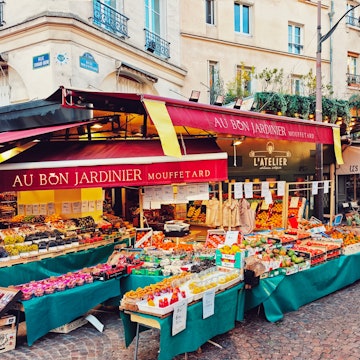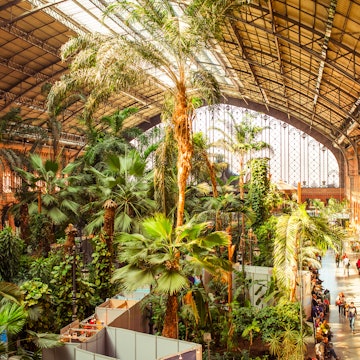
Burgundy on a budget: how to enjoy the chateaux, chablis and countryside on the cheap

Jan 30, 2022 • 8 min read

Head direct to the vineyards and wine-producing châteaux of Burgundy for great wine at cheap prices © Gu /Getty Images / Image Source
Bourgogne. The very name conjures up images of sumptuous chateaux, refined French living, swathes of elegantly groomed vineyards, and exceedingly fine wine in buckets – all with a hefty price tag to match.
Yet this historic wine region in eastern France is surprisingly affordable. Unlike its equally famous but more aristocratic, manicured sibling further west around Bordeaux, Burgundy remains a deeply rural, down-to-earth destination with mountains of things to see and do.
Burgundy has a fair share of historic abbeys and honeypot villages, dashing towns, and prized A-lister wines, bien sûr. But take one step away from the oenological glitz and razzmatazz of Côte de Nuits and Côte de Beaune, and you’ll quickly find yourself in a deeply provincial, refreshingly budget-friendly, part of France where French joie de vivre is wholly affordable.
Avoid high season
When you travel is key to the cost of your trip. The tourist crowd traditionally flocks to the region in summer and, to an almost equal extent, the milder shoulder seasons of spring and fall when seasonal colors and flavors blossom – nothing beats springtime markets overflowing with fresh produce and autumnal sunsets over golden vineyards.
But it is during low season, November to March, when you’ll get the most bang for your buck. Accommodation rates are at rock-bottom – up to 50% lower than in peak season – and there are some excellent deals on advance and small-group bookings. There’s always ample last-minute availability too.
January and February usher in a hat-trick of staunchly local festivals and celebrations, free to attend and offering a privileged backstage peek into traditional village life.
Figure out the best airport to fly into – and if it’s worth it
There is no airport. Travelers fly into Paris (Charles de Gaulle or Orly), best for Dijon and northern Burgundy, or Lyon-St Exupéry from where the Mâconnais vineyards, Romanesque abbeys, and medieval castles of southern Burgundy are easy to access. Count three to four hours by rental car from Paris to Dijon, and little more than an hour from Lyon to Mâcon – both journeys are predominantly autoroute (highway) with tolls.
Or reduce your carbon count by hopping on a train and once in situ, explore the region by bicycle, turbo-powered e-bike or e-scooter, on foot, and public car-sharing scheme for longer trips. Your environmental conscience will thank you for it.
Devote equal time to town and country
With their blockbuster museums, monuments, and architectural big-hitters, urban hubs like Dijon and Beaune draw tourists like bees to a honeypot. Cities and towns cook up a wide choice of accommodation, dining, and drinking venues – for most tastes and budgets.
But for those keen to save a few euros, devote time to the less-touristed Burgundian countryside. Poke around off the beaten track, and you’ll be pleasantly surprised by the enchanting auberges, locally loved village bars, and small independent wineries you might find – at a fraction of city prices.

Favor slow travel over speed
Such is the beauty bestowed on the region by Mother Nature that any trip from A to B in Burgundy quickly becomes an attraction in its own right. Go slow to prolong the moment, fully appreciate the sublime landscape – and reduce time spent in more costly towns, cities, and honeypot villages awash with touristy souvenir shops.
Not all slow travel is adapted to those on a budget (skip the hot-air balloon for example). Regional trains, buses and trams, car-sharing schemes, and a pair of wheels – bike, e-bike, or scooter – are all thrifty means of getting around slowly and thoughtfully.
Explore Burgundy on foot
France is legendary for its coveted walking terrain, spangled with well-marked trails ranging from ambitious, long-distance GR routes (Grande Randonnée) to gentle family rambles.
Burgundy is no exception. Budget explorers can walk for days along 6000km (3700 miles) of sign-posted footpaths, many along flat towpaths and through vineyards stretching as far as the eye can see. Our top pick: The hallowed pilgrimage trail from the tiny hilltop village of Vézely to Santiago de Compostela in Spain.
With picnics of gloriously stinky Époisses cheese, meaty rillettes (pâté-type spread), crispy baguette bread from the village boulangerie (bakery), and overnights in small country hotels, auberges (inns), and pilgrim hostels, thrifty spenders can get very far on very little.

Live like a Dijonnais(es) in a short-term rental
Burgundy’s capital spoils with a huge choice of accommodation, for all tastes and budgets. Its geographical location and decent public-transport links also make it a good base for those keen to deep-dive into northern Burgundy.
Dijon’s budget hotels – including Hôtel du Palais languishing inside a 17th-century hôtel particulier (historic mansion), or Hôtel du Chambellan and Hôtel Le Jacquemart, both aplomb in the heart of medieval Dijon – offer outstanding value for money. They also have rooms sleeping four, which are top value for families.
If you’re in town for longer than a couple of nights, short-term rental accommodation is a tip-top budget option – especially for families, couples, and small groups. Rentals range from bog-standard rooms with little outlook to enchanting, old-town apartments with original parquet flooring, exposed beams, and a traditional stone fireplace. Dijon tourist office runs an accommodation service and can hook you up with local apartment owners and rental agencies.
Cut sightseeing costs with a discount card
Municipal museums in Dijon, including the world-class Musée des Beaux-Arts (fine arts) and Musée de la Vie Bourguignonne (traditional Burgundian life and customs), and a host of others are free to enter. But for those keen to uncover and explore more key sights and experiences in the city and its surroundings, investing in a Dijon City Pass is a smart investment.
Valid for 24, 48, or 72 hours, the discount card covers unlimited public transport in Dijon and free admission to dozens of sights, including the enthralling MuséoParc Alésia in Alise Sainte-Reine, Unesco World Heritage-listed Abbaye de Fontenay, and the extraordinary, early Industrial-Age royal saltworks in Arc-et-Senans. It also offers a rash of discounts – 10% off e-bike rental with Active Tours, free perks at the factory boutique of Dijon’s iconic mustard maker Moutarde Maille, and so on.
Feast on Burgundian beauté for free
From Beaune’s awe-inspiring architecture and an interactive discovery museum dedicated to the region’s unique ‘climats’ (climate) to a myriad of scenic hikes, bike rides, and driving itineraries, the range of free things to see and do in Burgundy is gargantuan. Even with two or three weeks in the region, you’ll be hard pushed to tick off everything on the ‘freebie’ bucket list.
Notable standouts no thrifty traveler will want to miss: January’s wine festival celebrating the patron saint of local vignerons (winemakers); a free guided tour of sacred music concert at Vézelay’s soul-stirring hilltop basilica (a Unesco World Heritage site to boot); WWII memorial sites tracing the harrowed journeys of resistance fighters in the remote footsteps now-protected Parc Naturel Régional du Morvan; and watching the sunset atop La Roche de Solutré (short hike required).

Shop at food markets and don’t refuse a dégustation
Shopping for fresh seasonal fruit, veg, and other regional produce and culinary products at the weekly market is epicurean nirvana for gourmets eating their way around Burgundy. It also stretches your food budget further.
Market shopping – for picnics, travel snacks, culinary souvenirs, self-catering groceries – is a prime opportunity to hobnob with locals and strike up a conversation with farmers, producers, and stallholders. It is also a wonderful means of seeing with your own eyes exactly what fresh, zero-kilometer produce is in season (and, in turn, the seasonal dishes you should be favoring when eating out locally).
Try morning markets in Beaune (Wednesday and Saturday), along the Saône riverbanks in Mâcon (Saturday), and Dijon’s covered Les Halles Centrales for starters.
Show even a tiny bit of interest in an artisan product – miel de cérises (cherry-blossom honey made with cherries from Auxerre), pain d’épices (gingerbread) peppered with candied fruit or a stinky round of Soumantrain cheese washed in local brandy perhaps – and within minutes you might well be offered a free dégustation (tasting).
Fill your water bottle with wine
Sampling the bounty of Burgundy’s world-prized grape harvest with a winegrower between vines, in a bistro, bar à vins (wine bar) or restaurant is precisely why many visitors pick Burgundy – and there is no reason why wine buffs on a limited budget should miss out on the thrilling oenophile adventure.
Aside from savvy wine-tasting in the cellars of wine-producing châteaux, which is typically free, the cheapest way to buy wine is ‘en vrac’ (in bulk). Take your own empty bottle to any bar à vin, winery, cave du vin (wine cellar), or caviste (wine shop) displaying a sign reading ‘vins en vrac’ and fill it up with your choice of vin de Bourgogne. Some vats might contain bog-standard vin du table (table wine) costing as little as €4.50 a liter, but some will most certainly contain respectable reds and whites at a snip of supermarket or restaurant prices.
In rural Burgundy, look for the village cave coopérative (wine cooperative) selling wine by small growers from several surrounding villages.
Daily costs in Burgundy
Dijon bus or tram ticket €1.70 ($1.90)
Budget hotel double €60–80 ($68–90)
Bed and breakfast for two in a chambre d’hôte €70–200 ($80–225)
Coffee and croissant €4 ($4.50)
One-hour public bike share €2 ($2.25)
Museum or abbey admission €4–10 ($4.50–11.30)
Half-/full-day vineyard tour €65/130 ($73.50/147)
Three-hour wine-tasting class €80 ($90)
Bistro dinner €15–30 ($17–34)
Glass of sparkling Crémant de Bourgogne or Burgundy red €5–15 ($5.65–17)
You might also like:
Burgundy's most beautiful road trips to drive yourself to distraction
Why now is the perfect time to visit Burgundy on a budget
The best of Burgundy: 15 ways to find French joie de vivre
Take your France trip with Lonely Planet Journeys
Time to book that trip to France
Lonely Planet Journeys takes you there with fully customizable trips to top destinations – all crafted by our local experts.
























